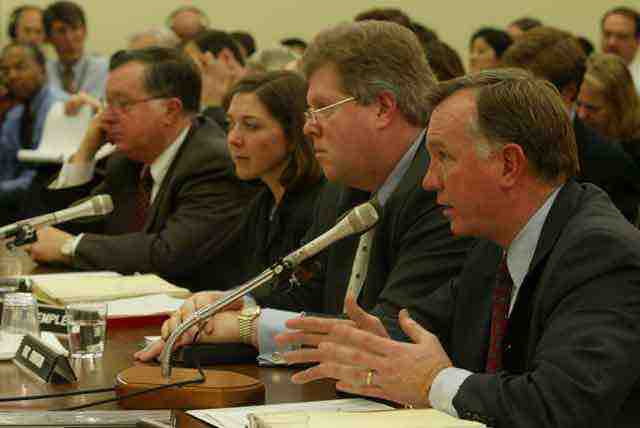Introduction
Congressional oversight refers to oversight by the United States Congress of the Executive Branch, including the numerous U.S. federal agencies. Congressional oversight refers to the review, monitoring, and supervision of federal agencies, programs, activities, and policy implementation. Congress exercises this power largely through its congressional committee system. However, oversight, which dates to the earliest days of the Republic, also occurs in a wide variety of congressional activities and contexts. These include authorization, appropriations, investigative, and legislative hearings by standing committees; specialized investigations by select committees; and reviews and studies by congressional support agencies and staff.

Arthur Andersen Witnesses
Arthur Andersen witnesses testify at the Subcommittee on Oversight and Investigations of the Committee on Energy and Commerce House of Representatives (107th Congress) hearing on January 24, 2002.
Congress's oversight authority derives from its implied powers in the Constitution, public laws, and House and Senate rules. It is an integral part of the American system of checks and balances.
Report on the Organization of Congress
Oversight is an implied rather than an enumerated power under the U.S. Constitution. The government's charter does not explicitly grant Congress the authority to conduct inquiries or investigations of the executive, have access to records or materials held by the executive, or to issue subpoenas for documents or testimony from the executive.
There was little discussion of the power to oversee, review, or investigate executive activity at the Constitutional Convention of 1787 or later in the Federalist Papers, which argued in favor of ratification of the Constitution. The lack of debate was based on the view that oversight and its attendant authority were inherent powers of representative assemblies, which enacted public law.
Oversight also is derived from the many and varied express powers of the Congress in the Constitution. It is implied in the legislature's authority, among other powers and duties, that it can appropriate funds, enact laws, raise and support armies, provide for a Navy, declare war, and impeach and remove from office the president, vice president, and other civil officers. Congress could not reasonably or responsibly exercise these powers without knowing what the executive was doing; how programs were being administered, by whom, and at what cost; and whether officials were obeying the law and complying with legislative intent.
The U.S. Constitution
Although the Constitution grants no formal, express authority to oversee or investigate the executive or program administration, oversight is implied in Congress's array of enumerated powers. The legislature is authorized to appropriate funds; raise and support armies; provide for and maintain a navy; declare war; provide for organizing and calling forth the national guard; regulate interstate and foreign commerce; establish post offices and post roads; advise and consent on treaties and presidential nominations (Senate); and impeach (House) and try (Senate) the President, Vice President, and civil officers for treason, bribery, or other high crimes and misdemeanors. Reinforcing these powers is Congress's broad authority "to make all laws which shall be necessary and proper for carrying into execution the foregoing powers, and all other powers vested by this Constitution in the Government of the United States, or in any Department or Officer thereof."
Activities and Training
Although the Constitution grants no formal, express authority to oversee or investigate the executive or program administration, oversight is implied in Congress's array of enumerated powers. The legislature is authorized to appropriate funds; raise and support armies; provide for and maintain a navy; declare war; provide for organizing and calling forth the national guard; regulate interstate and foreign commerce; establish post offices and post roads; advise and consent on treaties and presidential nominations (Senate); and impeach (House) and try (Senate) the President, Vice President, and civil officers for treason, bribery, or other high crimes and misdemeanors. Reinforcing these powers is Congress's broad authority "to make all laws which shall be necessary and proper for carrying into execution the foregoing powers, and all other powers vested by this Constitution in the Government of the United States, or in any Department or Officer thereof."